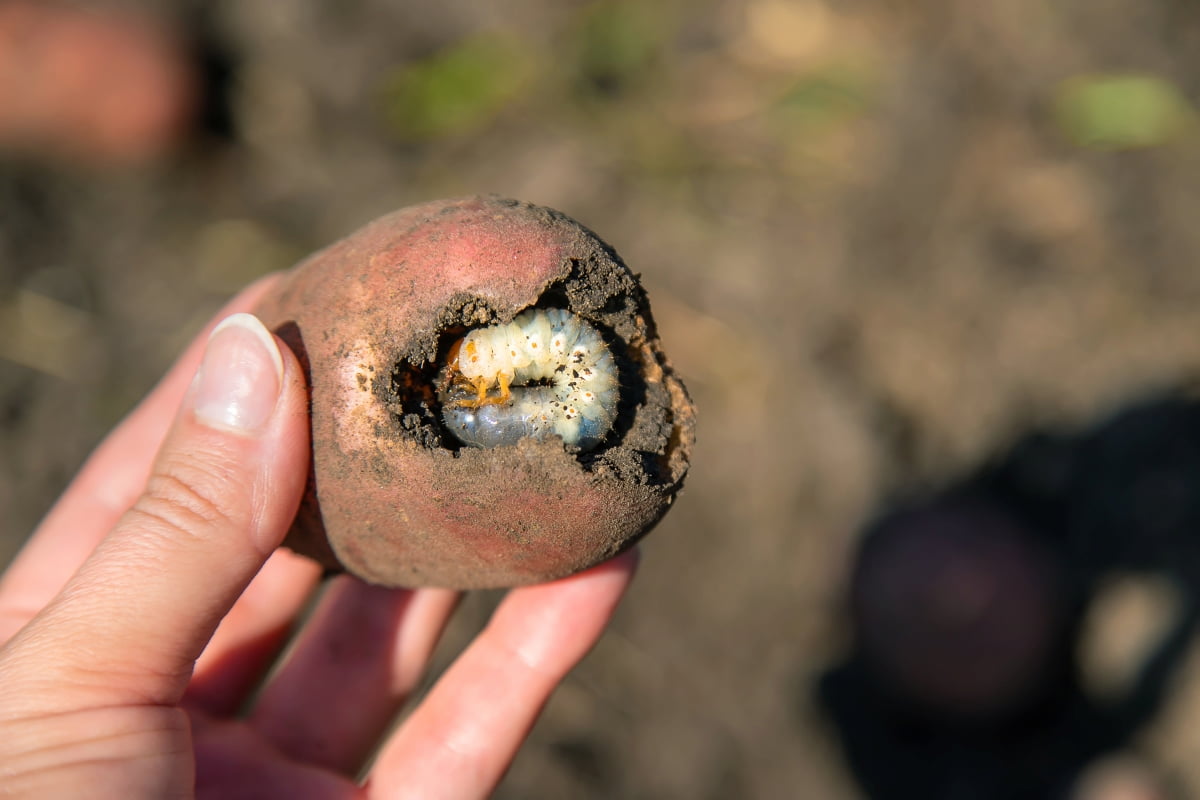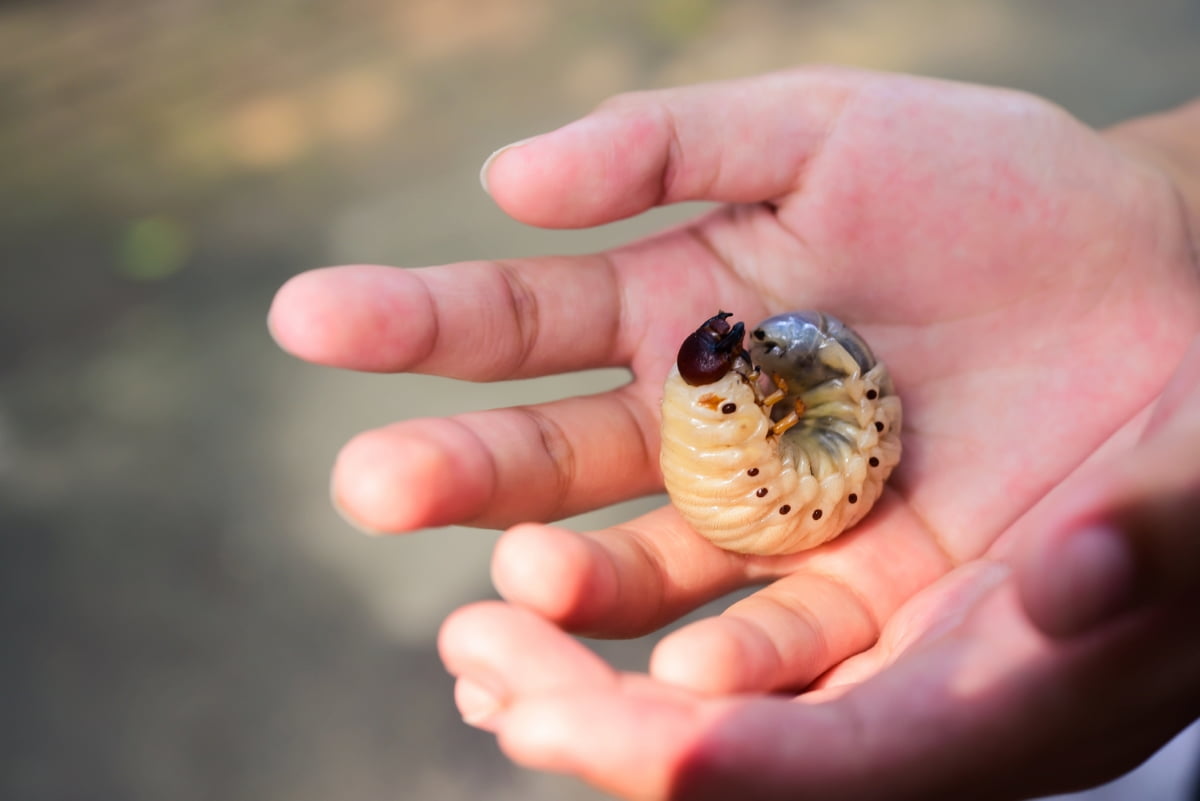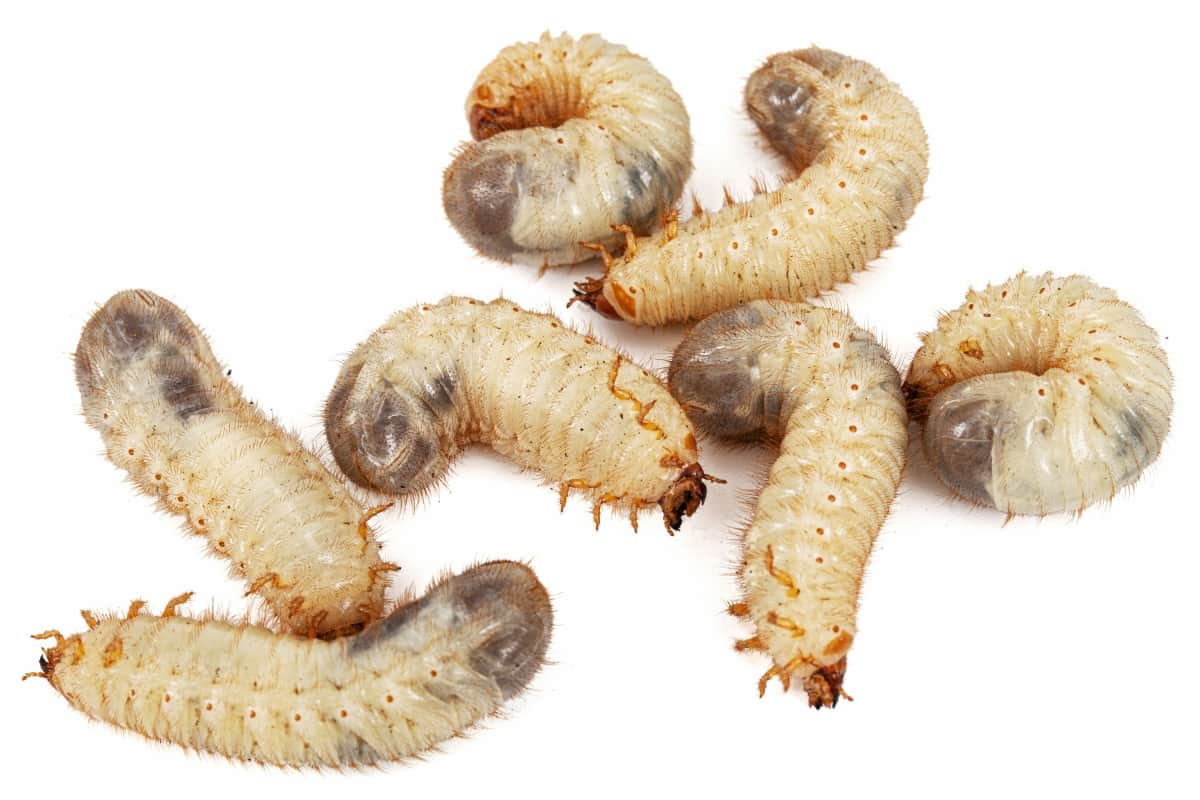Dealing with garden grubs can be a frustrating and challenging task. However, by utilizing natural and organic methods, you can effectively control and prevent these pesky pests from wreaking havoc on your garden. Remember to identify the type of grubs present in your soil to determine the best course of action. By staying proactive and taking immediate action, when necessary, you can maintain a healthy garden free from destructive garden grubs.

When identification of grubs in the garden, they have soft bodies with distinct C-shaped curves and six legs near their heads. Most grubs found in gardens are about 1/4 to 2 inches long. White grubs in garden soil can be a pesky problem for gardeners, as they feed and cause significant damage to your garden. The fastest way to eliminate grubs may vary depending on your preference and circumstances. Experiment with different methods until you find what works best for you.
How to Get Rid of Garden Grubs
Natural Methods to Eliminate Garden Grubs
Natural methods are often the best solution when dealing with grubs in your garden. How Do You Get Rid of Grubs Naturally? One natural way to control grubs is by introducing beneficial nematodes into your soil. These microscopic worms feed on the larvae of insects like grubs, effectively reducing their population. Mix the nematodes with water and apply them to the affected areas of your garden.
Another method involves attracting birds to your garden. Birds love snacking on grubs, so creating a bird-friendly environment with bird feeders, birdbaths, and native plants will encourage them to visit regularly and feast on those unwanted critters. Additionally, introducing predatory insects like ground or rove beetles can help keep grub populations in check. These insects feed on grubs in their larval stage and can significantly reduce their numbers over time.
One effective homemade grub killer for your vegetable garden is a mixture of dish soap and water. Mix one tablespoon of liquid dish soap with a gallon of water. Spray this solution directly onto the affected areas of your garden where grubs are present. The soap will suffocate the grubs while being gentle on your plants.
How to eliminate Grubs in Vegetable Gardens Naturally? Keeping your garden clean and debris-free will discourage grubs from making themselves home in your soil. Additionally, yearly rotating crops can help disrupt their life cycle and reduce populations. If you already have a grub problem, there are organic solutions that can effectively control them. One option is introducing beneficial nematodes into your garden. These microscopic organisms’ prey on grubs and other harmful insects, acting as a natural biological control method.
One of the pet-friendly ways to get rid of grubs is using diatomaceous earth. This powdery substance is made from fossilized remains of algae and works by dehydrating and killing grubs on contact. It’s safe for pets if they don’t inhale large amounts, so be cautious when applying it. You can also try companion planting with plants that deter or repel pests like Marigolds or Garlic. These plants emit strong odors that grubs find unappealing, keeping them away from your garden while still being safe for pets.
Effective Techniques for Getting Rid of Garden Grubs
Several techniques have proven to be effective in eliminating garden grubs. One method is handpicking and disposing of them in a bucket of soapy water. This may seem tedious, but it can be quite satisfying and ensures that you remove every last grub. Another technique uses beneficial nematodes, microscopic worms that attack and kill grubs. Can Neem Oil Kill Grubs? Neem oil has been used for centuries as a natural insecticide and fungicide. Regarding grubs, neem oil can indeed be effective in controlling them.
The active compounds in neem oil interfere with the growth and development of grubs, ultimately leading to their demise. It disrupts the feeding habits of grubs and prevents them from growing into adult beetles. In addition to these methods, practicing proper lawn care can help prevent grub infestations in the first place. Regularly aerating your soil, watering deeply but infrequently, mowing at proper heights, and avoiding over-fertilization will create unfavorable conditions for grubs to thrive.
Preventing and Treating Garden Grub Infestations
Preventing and treating garden grub infestations is crucial to maintaining a healthy and thriving garden. These pesky grubs can cause significant damage to your plants, leaving them weakened and susceptible to disease. Fortunately, you can employ several effective methods to keep these pests at bay. One of the best ways to prevent grub infestations is by practicing good lawn maintenance. Regularly mowing grass at the appropriate height will discourage adult beetles from laying eggs in your yard.
In case you missed it: Herbal Remedies for Houseplant Pests and Diseases: Prevention, Treatment, and Solutions

Additionally, aerating your soil can help improve drainage and make it less appealing for grubs to inhabit. Another preventive measure is promoting biodiversity in your garden. By planting various species, you can attract beneficial insects that prey on grubs naturally, such as birds or ground beetles. Creating diverse habitats with native plants will also encourage a balanced ecosystem that reduces the likelihood of grub infestation. If you notice brown patches in your lawn or stunted growth in your vegetable patch, it may indicate underlying grub activity.
Proven Remedies to Eradicate Garden Grubs
Consider manually removing the grubs from your soil if you prefer a more hands-on approach. Use a trowel or gardening fork to unearth them from beneath the surface gently. Be sure to dispose of them properly by placing them in a sealed container or feeding them to birds. Additionally, applying milky spore powder can be an effective long-term solution for grub control. This naturally occurring bacteria targets Japanese beetle larvae while harmless to other beneficial insects.
Don’t underestimate the power of companion planting. Certain plants like Marigolds and Garlic are known for deterring grubs due to their strong scent or chemical properties. Incorporating these plants into your garden beds can create a less inviting environment for grubs. Remember that different methods may work better depending on your situation, so don’t be afraid to experiment until you find what works best for you.
Steps to Eliminate Garden Grubs from Your Yard
If you’ve noticed garden grubs wreaking havoc on your yard, it’s time to take action. Start by identifying where the grubs are most active in your yard. Look for signs of damaged grass or plants, brown patches, or wilting foliage. When it comes to treating grubs in your garden, timing is everything. The best treatment time for grubs depends on their life cycle and when they are most vulnerable.
The grubs transform into pupae in late spring or early summer and eventually emerge as adult beetles. This is a critical window of opportunity for treatment, as targeting them during this stage can help prevent future infestations. Treat your yard with beneficial nematodes. These microscopic organisms naturally occur in soil and feed on garden grubs, making them an excellent natural control method.
Mix the nematodes with water and apply them evenly across your lawn. Another effective step is using milky spore powder. Sprinkle the powder onto affected areas during late summer or early fall when grubs feed actively. Additionally, consider applying an insecticidal soap solution to kill off any remaining grubs in your yard. Mix liquid dish soap and water and coat affected plants thoroughly.
Successful Strategies for Eradicating Garden Grubs
One effective method is soil solarization, which covers the infested area with clear plastic during the hot summer. The heat under the plastic will kill the grubs and their eggs. If you’re looking for a natural and effective way to control garden grubs, beneficial nematodes for grubs may be your solution. Mix beneficial nematodes with water according to package instructions and apply them directly onto moist soil.
Keeping the soil moist after application is important as it helps the nematodes move through the ground more effectively. Encouraging natural predators like birds, frogs, and toads in your garden can help keep the grub population in check. Providing food sources such as insects and water features will attract these natural predators.
In case you missed it: Homemade Sage Spray for Pests and Disease Control: Recipe for Organic Benefits of Plants

Applying milky spore disease powder to your lawn or garden can be an effective long-term solution against Japanese beetle grubs. Maintaining a healthy lawn by mowing at the correct height, watering properly, and aerating regularly helps prevent grub infestations by creating unfavorable conditions for their survival. Implementing these successful strategies will rid your garden of grubs and promote overall plant and ecosystem health.
Conclusion
Garden grubs can wreak havoc on your beloved garden if left unchecked. By understanding what garden grubs are and the damage they can cause, you’re already one step ahead in protecting your plants. Implementing organic control methods such as handpicking, using beneficial nematodes, or applying insecticidal soap can help reduce their numbers without harming the environment.
Prevention is also key in keeping these pesky pests away from your garden. Practices like crop rotation, maintaining healthy soil conditions, good sanitation habits, and attracting natural predators will create an inhospitable environment for them to thrive. It may take time for the population to decrease significantly, but following these tips consistently over time can maintain a healthy and grub-free garden.
- Feed Your Flock for Less: Top 10 Tips to Save on Chicken Feed
- Ultimate Guide to Ossabaw Island Hog: Breeding, Raising, Diet, and Care
- Hatching Answers: The Top 10 Reasons Your Chickens Aren’t Laying Eggs
- Eggs and Economics: Breaking Down the Cost of Raising Backyard Chickens
- Defend Your Greens: Proven Methods to Keep Iguanas Out of Your Garden
- Ultimate Guide to Cinnamon Queen Chicken: A Comprehensive Guide for Beginners
- Ultimate Guide to California Tan Chicken: Breeding, Raising, Diet, Egg-Production and Care
- Ultimate Guide to Marsh Daisy Chicken: Breeding, Raising, Diet, and Care
- 10 Types of Chicken Farming Businesses You Can Start for Profits